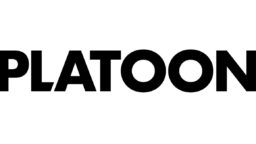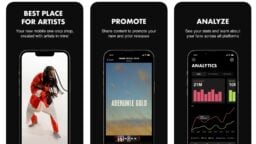They might not realise it, but some of the hottest acts in the world today owe a serious debt of gratitude to Kenny Loggins.
Yep. Footloose Kenny Loggins. (Ride into the) Danger Zone Kenny Loggins.
Designer-bearded, snazzy-blazered, ‘80s synth-soundtracking Kenny Loggins.
Bear with us here.
Over the past year, London-based Platoon has emerged as one of the world’s most nattered-about, thought-provoking new music companies.
Offering a range of distribution, funding and marketing services to emerging and ‘unsigned’ artists, the startup has partnered with arguably the two most anticipated new acts of 2018: New York-based Yebba and UK-based BRIT Award winner Jorja Smith.
Signings like these have made Platoon’s A&R hit rate the envy of the major labels.
Other artists in its network with millions of streams to their name include the likes of Mr Eazi, Maleek Berry, Gabrielle Aplin and Raleigh Ritchie, while artists like Billie Eilish and Stefflon Don have been ‘incubated’ at Platoon before being migrated into major labels.
All of the artists mentioned above are wired into modern youth culture – and, to various extents, have wriggled out of the crosshairs of big-spending label A&R departments.
With all due respect, they are a world away from Kenny Loggins.
And yet, it transpires, also not.

Platoon was co-founded in 2016 by two entrepreneurs: Denzyl Feigelson and Saul Klein.
The duo had differing, but mutually impressive, track records – and a shared belief that artists (and not only music artists) could, and increasingly would, achieve global success on their own terms.
Klein (pictured left) was the co-founder and CEO of movie rental service Lovefilm, which was acquired by Amazon in 2011, and consequently became the lynchpin of Jeff Bezos’ Amazon Prime Video service.
He is also a venture capital kingpin with a predilection for music apps – having headed funding centres whose investments cover the likes of Songkick, last.fm, SoundCloud, Sofar Sounds and Sonos.
Feigelson (pictured right), meanwhile, is well-known to the UK music industry, having been an integral part of Apple’s international music strategy – not to mention the 10-year iTunes Festival – for over a decade as a special advisor to the Cupertino giant.
“The label said, No way – this is career suicide, it’ll never work.”
He was a close confidant to the Steve Jobs circle throughout Apple’s third golden age: from the iPod through the iPhone, the iPad, iTunes and into the beginnings of what would become Apple Music.
Three decades before all off that, however, Feigelson was a talent manager, working with a string of artists in his native South Africa.
After helping Paul Simon alchemise his Graceland album into a classic, Feigelson moved his business to the Brill Building in New York before eventually settling in Los Angeles, following an invite to work on A&M’s Windham Hill imprint under Herb Alpert.
From there, in the early nineties, Feigelson joined legendary ‘Supermensch’ Shep Gordon at LA-based management outfit Alive Enterprises, looking after the likes of Johnny Clegg, the Gypsy Kings and – guess who? – Kenny Loggins.
It was entirely thanks to Loggins, 25 years ago, that an elemental belief was galvanised within Feigelson – one which would go on to form a defining philosophy of Platoon.
“One day Kenny says, ‘I want to make this children’s record,’” recalls Feigelson. “He was raising a family and he was tired of all the kids’ records they were playing, so he decided he’d make one himself. I thought it was a great idea.”
“[Sony’s] reaction was, You’ll be wasting your money, and you’ll come back to us when that cash runs out.”
Feigelson swung by the New York HQ of Sony Music, to whom Loggins was signed as a bankable property, and explained the concept.
He thought it would be a straightforward affair, with an advance wired their way in due course. He was badly wrong.
“I excitedly pitched the label and told them about the album, and they said, ‘No way – this is career suicide, it’ll never work. Plus on page 126 of Kenny’s contract it clearly says you have to deliver pop albums in the vein of your first record. Contractually, therefore, you cannot make this album.’”
Feigelson was perplexed, telling the label in no uncertain terms that he thought their actions were “unfair to the creative process”.
After some fiery exchanges (not quite suitable for print), he informed Sony that Loggins would make the record outside of his contract with the act’s own money – which he subsequently did, for a total cost of $125,000.
“[Sony’s] reaction was, You’ll be wasting your money, and you’ll come back to us when that cash runs out,” recalls Feigelson.
Fans of David vs. Goliath upsets, feast your eyes: Loggins’ album, Return To Pooh Corner, became an extremely rare independently-issued success story on its release in 1994.
Featuring songs written by John Lennon, Rickie Lee Jones, Jimmy Webb and Paul Simon, it was Grammy-nominated and went on to sell over half a million copies.
Sony consequently paid up to bring the record in-house – even forming a label around its ‘stars do music for kids’ concept, called Sony Wonder.

Feigelson’s next move, interestingly enough, was to quit music entirely.
He semi-retired, skipped off to Hawaii and started a direct mail flower business, shipping rare local varieties to the US via FedEx – all purchased via a rudimentary online ordering system.
And then, one day, he had a brainwave.
“I realized that the internet would revolutionise the music business for the exact same reason my flower business was successful,” he says.
“All these amazing artists who make records that aren’t of interest to labels would be able to find an audience directly.”
“I realized that All these amazing artists who make records that aren’t of interest to labels would be able to find an audience directly.”
Feigelson built Artists Without A Label (AWAL), one of the world’s first direct-to-fan record websites, and moved back to California.
AWAL customers could order CDs online for $10 plus postage; Feigelson had the discs stacked up in his garage.
AWAL artists would keep ownership of their copyrights, and receive the lion’s share of the financial proceeds.
“What the experience with Kenny and the children’s album taught me at that time was to do the exact opposite of a record deal,” says Feigelson.
“Instead of a 100-page contract, I created a one page contract; instead of the artist owning 15%, the artist owned 85%; instead of exclusive, I made it non-exclusive.”
By 2001, AWAL was selling records by hundreds of artists across both CD and download. Feigelson soon caught the eye of Steve Jobs and Apple, and started a journey which would consume the next stage of his professional life.
After working on the iTunes US launch in 2003, Feigelson moved to London in 2004 to work on the international expansion of the download platform.
However, he kept AWAL going as a background concern – eventually selling it to Kobalt for a seven-figure sum in 2012.
And that – admittedly rather skipping over the biggest digital revolution the music industry has ever seen – takes us up to the beginnings of Platoon, a venture which is enabling Feigelson to paint his passion for artist independence on a far broader canvas.
In the run up to launching Platoon in 2015, Feigelson and Klein held multiple meetings with emergent independent artists to ask what they needed to get their careers motoring in the age of SoundCloud, YouTube, Apple Music and Spotify.
The duo were told time and again that these acts had a simple plan: building their presence on SoundCloud and social media to the point that major labels would start flocking towards them.
The fundamental idea of Platoon, then, was to offer a new option: providing the functions and expertise that a major label might inject into an artist’s career – but with a deal heavily weighted in favour of the talent.
“We believe that artists do their best work when they have creative and economic freedom.”
Today, when you snoop around the gleaming Platoon offices at Tileyard, North London, you’ll find recording studios and creative edit suites on site – spaces for creative minds to fulfil their potential without the need for funding derived from traditional sources.
This level of high-touch A&R resource, combined with strong, data-driven distribution, marketing and promotional capabilities, is at the heart of Platoon’s sudden-seeming impact.
“We believe that artists do their best work when they have creative and economic freedom,” explains Klein. “That’s absolutely true in the world of software and business, and it’s absolutely true in the world of music.”
Platoon also has its eyes and ears wide open to other creative sectors – books, video, education etc. – and will look to apply the same model to those industries in the future.
Adds Klein: “If you’re an independent creative today, the economics have tipped in your favour. There are 3.5bn people with smartphones in the world; by 2020, that will be up to 5bn.
“If I look 10 years out, with all of the platforms we already have and imagining those which are yet to be introduced, I just can’t see a world of a dominant major label system.”
None of this, however, adequately explains Platoon’s prolific and prodigious ability to spot and sign talent early, and to associate itself so closely with a new wave of commercially formidable new artists.
Take Mr Eazi, for example. Platoon helped to fund his various projects and create his video for single Leg Over for under £5,000.
Released last year, it’s now attracted over 30m plays on YouTube.
In fact, across Platoon’s 200-strong artist roster, the company monitored just under a billion streams on all platforms in 2017.
“There’s no website, no submission process – the ‘secret sauce’ is simply our ears, and that our network is amazing,” Feigelson says of Platoon’s A&R potency.
“Now the word is out, artists are telling other artists about us.”
What those artists will be presented with in response: Platoon’s enviable track record to date – and a ringing endorsement of the upsides of remaining independent; creatively and economically free.
Adds Feigelson: “Artists like Yebba, Eazi and Jorja thrive on realtime creative freedom.
“I’ve seen so many artists, working under pressure, lose their light over the decades. They have all this energy and this magic. But the process can be hard on their innate creative process.”
MBW understands that the aspirational Platoon deal sees the company offer career-long support, creative freedom and marketing firepower in exchange for a minority stake in an artist’s independent business.
The firm also recently launched its own publishing company, allowing it to cross-pollinate in the expansion of an artist’s career.
For example, an act can take out a publishing advance, and recoup it with their masters income. With Klein’s background in mind, these kind of structures are no surprise.
“We’ve got a long-term perspective on our artists and how the industry’s going to change in the coming years,” says Klein.
“In the venture world, if you find someone with a truly great idea, you have to take a 7-10 year view. If they do well, you do well – that’s the right kind of alignment.”
Where Klein says this comparison loses its relevancy for Platoon is at the point of the ‘e’ word: exit.
When a venture capitalist invests in a startup, often it’s with the hope that a big payday will come down the line via an acquisition. In artist land, that big cheque is, as we stand today, typically coming from one direction: the major labels.
“I really do think a global artist will break through Platoon and it will change perceptions.”
Platoon-signed artists such as Billie Eilish (Interscope) and Stefflon Don (Polydor) have taken that cheque after building a redoubtable fanbase in lockstep with Platoon.
Won’t that always be a challenge to the startup’s model? When Platoon helps artists construct a brand and market presence, only for a corporation to swoop in just when these acts’ commercial appeal is going mainstream?
“We’re pretty label-friendly,” responds Feigelson. “We have great relationships with every label and we often have ‘can we do this together?’ conversations.”
Feigelson takes pride in the fact that Platoon played a role in helping Stefflon Don and her management think through deal structures that were more artist-friendly ahead of signing her agreement with Universal.
“I really do think a global artist will break through Platoon and it will change perceptions,” he says.
“You’ve got years of the deep-rooted pattern [from the majors]: ‘In order to be a global superstar you need investment and global infrastructure, you need boots on the ground, you need big money spent on international.’
“This is all true, of course, and can certainly work for a select group of artists. But we live a different world now.”
As opposed to spending “big money”, says Feigelson, Platoon is laser-focused on using multiple data points to guide how and when it invests in an artist’s career.
It’s common-sense spending, he says, but never tightfisted in the face of opportunity, like when Platoon green-lit smart marketing funding –along with her management – for Jorja Smith’s recent single and video, Let Me Down (ft. Stormzy).
“When you know how to interpret data, you can be so smart about where you spend your money,” says Feigelson.
The proof of Platoon’s concept will be given a great lift this year if Jorja Smith fulfils her potential as an era-defining talent, both at home and around the world.
Feigelson has no doubt that’s exactly what’s on the cards.
“Jorja’s career is growing in the most organic and beautiful way,” he says. “No-one’s telling her what to do as an independently and creatively free artist – she knows exactly what she wants.
“From the first day I met her, she was like, ‘My first song’s going to be Blue Lights… and here’s what we’re going to do for my second and fourth song. Oh, and for my third song, we don’t have that yet, but I can sing it for you, and here’s the idea for the video.”
“Jorja’s career is growing in the most organic and beautiful way.”
Smith recently performed as the opening act on Bruno Mars’ US tour, while Coachella dates are also in the pipeline – building nicely on her BRITs Critics’ Choice win.
It’s all a long way from Kenny Loggins and the children’s album that Sony rejected.
And yet, it transpires, also not.
“I didn’t even question Kenny’s intuition in that moment,” says Feigelson.
“He had a feeling: this album is needed in the world. “All true artists have this unique intuition that comes from the very same place that makes them artists.
“Platoon’s job isn’t just to help that come out – it’s to let it roar.”

MBUK is available via an annual subscription for £64.99 (plus £25 postage outside the UK) below.
An annual digital-only subscription to the magazine is also available for £39.99, plus VAT where applicable.
To book your subscription, please fill in the below and an invoice will be issued within 24 hours.
All physical subscribers will receive a complimentary digital edition with each issue.
Music Business Worldwide





